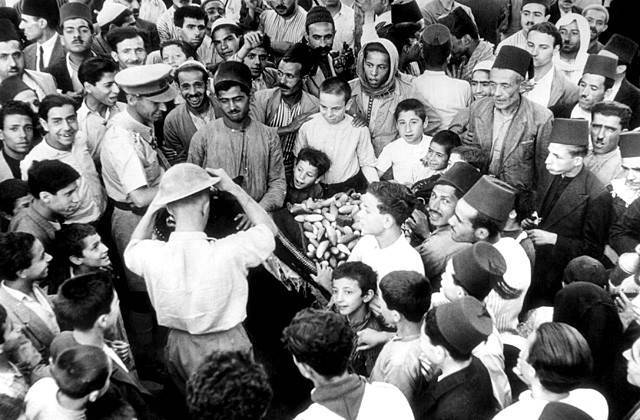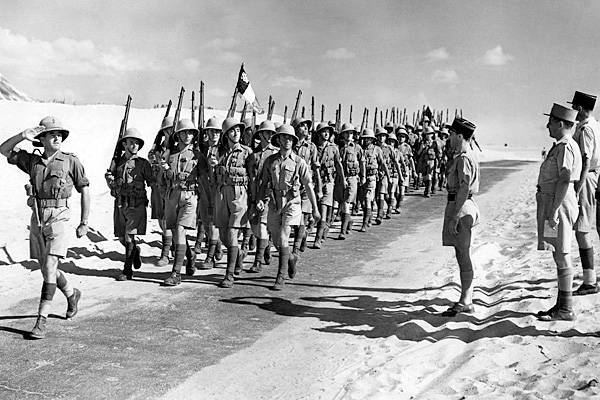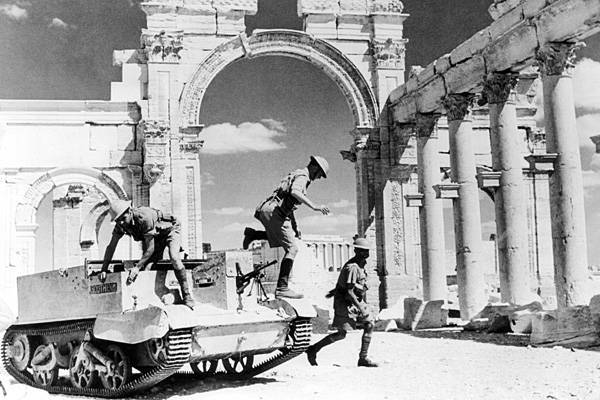Syrian Operation 1941 of the Year: Allied First Victory

The French Vichy miscalculated, making then a bet on the Sunni Arabs
"Russian Planet" continues a series of stories about the little-known fronts of the Second World War. In our first article we told about the Somali campaign 1940 — 1943, in which the British defeated the Italians and thereby prevented their access to Egypt and the Middle East from the south. In fact, this battle was the first in which one of the Axis countries suffered a major defeat (the main forces of the Italians were defeated in November 1941 of the year).
However, the Allies formally first defeated the enemy earlier - in the summer of 1941, in Syria, before Germany entered the war with the USSR.
As you know, France in the 1940 for a short time resisted the German offensive and quickly surrendered to Germany (the capitulation was signed on 25 in June of 1940). The Germans occupied the northern part of France, and the collaborationist Vichy regime ruled the southern part of the country.
Numerous colonies and protectorates of France in Africa, Asia and Latin America recognized the Vichy regime. This was done by the colonial leadership of Syria, whose mandate for the management was transferred to France following the results of the First World War.
By the beginning of 1940, France held a large military grouping in Syria - 120 thousands of people. After the capitulation, the Italian-German commission allowed the Vichy regime to leave only 35 thousands of soldiers and officers here. The French units swore allegiance to the Axis countries.
The French and the Germans destroyed the national question
In October, the emissary of de Gaulle, General Katra, arrived in Syria on 1940, and began campaigning among the troops, inclining them to go over to the side of the “Free France” - the anti-fascist movement. Around the same time, the new head of the French administration, General Henri Dentz, a supporter of an alliance with Hitler, arrived in Syria. The army and the colonial leadership sided with Dentz, finding it foolish to hope in the near future to win over Germany. They could be understood - the Axis countries (Germany, Italy and Japan) at that moment won one victory after another, the USA remained neutral, and the USSR was in a state of friendship with Germany.

The first decision of General Dentz in Syria was the formation of units from Sunni Arabs. It eventually ruined his mini-mode.
Like today, in 1940, the majority of the population of Syria (it was 3,7 million people) were Sunni Arabs - about 65%. The remaining 35% are Christian Arabs, Shiite Arabs, Druze, Alawites, Circassians, Armenians, Maronites, and dozens of smaller national and religious groups. Like today’s Assad regime, until 1940, the French colonialists relied on these minorities, keeping the Sunni Arabs under a double yoke.
Dentz decided to bet on the largest part of the Syrians - Sunni Arabs. This decision was not entirely independent - the idea was proposed to him by the Germans. Germany in 1940 — 1941 welcomed Arab nationalism, hoping that Sunni rebellions in the mandated territories and colonies of England would help the Germans to more successfully carry out an operation against a weakened enemy.
Up to 300 German agents arrived in Egypt and Iraq, about 50 million marks were allocated for subversive work in these countries. In May 1941, the first clashes between the British and the rebels of the tribal leader Rashid Ali took place in Iraq, he was supported by the German aviationusing French airdromes in Syria for intermediate basing and refueling (reconnaissance of the area was carried out from aircraft, weapon, ammunition, communications equipment). Syria has become the most important base for Germany, with which the Nazis lead subversive work in the Middle East, North Africa. The airfield in Aleppo actually became German. Germany also insisted that Syrian Vichyists give 80% of weapons and ammunition from their warehouses to Arab rebels in Iraq.
14 May 1941, British Air Force aircraft bombed French airfields in Syria. This day was the beginning of the Syrian campaign.
At first, the campaign was sluggish. In late May, the anti-British uprising in Iraq was crushed. Dentz appealed to Germany with a request to withdraw the German military mission from Syria in order to deprive the British of a reason for a ground invasion. By 6 June, all German aircraft and military personnel left Syria.
Vichyists unexpectedly stubbornly resisted
It seemed that the Syrian Vichyists no longer gave reasons for the British to conduct a military operation against them. But 7 June, literally a day later, as the last German soldier left Syria, Churchill gave the order for a ground operation. 8 June Australian and Indian units, with the support of volunteers from the Free French, crossed the border of Syria. The commander of the English grouping (80% of its composition, however, were not the British, but soldiers from the colonies and dominions), General Wavell spent only a week on the operation - he did not believe that the Vichyists would be able to provide serious resistance, including for moral reasons - not they will seriously fight for German interests.
But it was not there. French collaborators put up decent resistance to the British.
The English units advanced in three columns. The first one (and the main one) went from Palestine and Transjordan to Damascus with a parallel movement along the coast towards Lebanese Beirut. The second column was advancing from southern and central Iraq through the desert in the direction of Palmyra. The third was advanced from northern Iraq by the forces of the 10 Indian Division along the Euphrates valley in the direction of Aleppo.
The English grouping numbered 34 thousands of people (18 thousands of Australians, 9 thousands of British, 2 thousands of Indians and 5 thousands of French from Free France). They were opposed by 35 of thousands of Vichy. But, like the Italians in Somalia, the bulk of them were the indigenous troops - Tunisians, Algerians, Senegalese, Moroccan - they were 27 thousands. Only the remaining 8 of thousands of French soldiers and officers, including parts of the Foreign Legion (about 3 thousands), were truly effective.
English fleet bet
And again, as in the Somali campaign, the technical superiority of the British affected. They had two and a half squadrons of fighters, two squadrons of bombers, an army support squadron (total 72 aircraft) and Royal Navy aviation: two Sardfish squadrons and one Albacore squadron (total 33 machines). From the sea, the invasion force was supported by two cruisers, eight destroyers, and an air defense cruiser. Vichy initially had 90 airplanes (slightly less than the British), but after a couple of weeks reinforcements arrived from North Africa and the total number of vehicles reached 160 - against the British 105.
What then was the technical superiority of the British? Initially - in navy. The English fleet blocked the approaches to Lebanon and Syria from the sea. This blockade spoke of only one thing: as in Somalia, the Vichy won’t win a defensive war (there is no supply of ammunition, equipment, fuel, spare parts), there is only one hope - an offensive blitzkrieg, an attempt to defeat the enemy’s ground forces in 2-3 weeks.

The British faced the most fierce resistance in the south of Syria. The British 9 June landed there (near the river Litani) troops. These were the best parts of them, they were opposed by the Moroccans and Algerians. As a result of the almost daily combat, 25% of the British paratroopers were killed, including their commander, Lieutenant Colonel Pedder, who died. Up to 20, two battalions of Australian infantry were killed that day. The British were confused, not expecting such fierce resistance from the Vichyists.
German plan of war in the Middle East
The Germans did not believe in the imminent defeat of the Vichists. The OKW Directive No. 32 of 11 June 1941 of the year spoke of the conquest of the Mediterranean, North Africa, the Near and Middle East, while simultaneously renewing the "siege of England." Following this, the Nazi leadership portrayed the prospect of conquering India and transferring military operations to the American continent. The German General Staff, in particular, saw the development of the situation in the Middle East in this way: “As soon as the war in the East (against the USSR. - RP) moves from the defeat of the enemy’s armed forces to the economic suppression of the enemy, the next tasks of the war against England will come to the fore , the implementation of which should then proceed immediately. They will require the following activities.
It is necessary to prepare an offensive through the territory between the Nile and the Euphrates from Cyrenaica and through Anatolia, and possibly from the Caucasus through Iran. The first direction, which will always be dependent on maritime communications and therefore will remain subject to all kinds of unaccountable accidents, will be a secondary theater of operations, which we will provide mainly to Italian troops. From our side only two full tank divisions (5th light and 15th).
The operation through Anatolia against Syria will be started by concentrating the necessary forces in Bulgaria, which should also be used for political pressure on Turkey in order to obtain permission to pass troops through its territory. ”
War wins technology
And yet, despite significant losses, the British, step by step, moved from the south of Syria to the capital, Damascus. And then the Vichy "reserve regiment" entered the battle - a tank brigade of 70 vehicles (they left 20 tanks for the defense of Damascus from British columns from the east and northeast). A week later, the French collaborators fought off the strategically important city of Quneitra. The onslaught of the Vichy was so strong that the British began to surrender en masse (one of the battalions even surrendered in full force).
The British were forced to transfer from North Africa two fighter squadrons and three bomber squadrons - up to one hundred aircraft in total. Now their superiority over the Vichyists in the air was a third more, and according to the bombers - twice.
So it was in Somalia. And not only - for the allies during World War II it became a general rule that an attack on the enemy can be conducted only with total superiority in technology. So it was in the operation in North Africa against Rommel, when they opened the Second Front, first in Sicily in 1943 and then in 1944 in France. The same strategy was used by Americans in the Pacific, starting with 1944. And this strategy of the Americans and the British radically different from what was happening on the Soviet-German front. The Allies attacked equipment, the Red Army - the soldiers.
The break in the minds of the British in the Syrian campaign came after the famous (by local standards, of course) battle in the village of Metsi. There, June 19 defended the Rajputan and Punjab battalions (from the Indian parts of the British). For two days, tanks and colonial infantry of the Vichyists attacked the surrounded village. When the Hindus survived a third, Colonel Jones sent a message to the Vishists asking for a truce to collect the wounded and the dead. Vichy refused. A few hours later both battalions were completely destroyed.
The British for the first time in the Second World War faced such treachery of the enemy, not observing the elementary gentlemen's rules.
The British bombers began to iron the position of the Vichyists on the entire front. And - a small but important nuance - with the observance of those very gentlemanly rules: airplanes, as well as artillery did not strike at historical to cities. For example, on June 21-22, 1941, Damascus was surrendered by the Vichy without a fight - the British provided them with a day to leave the city. Not a single historical building, not a single mosque and Damascus church were damaged during this campaign.
The capture of Damascus 21 June 1941, the year before the start of the war of Germany against the Soviet Union.
Such a rapid fall in the southern and western part of Syria was the result of not only British efforts, but also the transition to their side of those national minorities of the country that we spoke about earlier. For example, the Circassian squadrons, which had long been the personal guard of the Syrian rulers and at the same time very combat-ready units, simply took off from the front and went to their villages. Druzes and Alawites cut the Vichy link, blew up bridges, and at the end of the campaign in this region, the guerrilla struggle against the French colonists was openly launched.
The legendary English scout Glabb Pasha enters the battle
But in the east and in the center of Syria, where Sunni Arabs made up 85% of the population of the region, the British, after 21 June, had to make their way to the west of the country with heavy fighting.
English General Clark hurried, and threw into the battle of the unit without the support of aviation, believing the enemy had broken the spirit after the fall of Damascus. And he paid dearly for it. June 26, the field commander of the anti-British Sunni partisans, Fawzi al-Kawuji, in the rear defeated an English convoy that was carrying fuel for equipment. A day later, British tanks were forced to stop the offensive.
Saved the British Arab Legion under the command of the Glabb Pasha. Under the name of Glubb-pasha, there was an Englishman hiding, Sir John Baggot Glabb - the son of an English general, a colonel who was no less legendary intelligence officer than Lawrence of Arabia. In 1920, he was sent by the British crown to the deserts of the Middle East to work with the Bedouins. Glebb learned to speak Arabic, began to dress like an Arab, adopted all their habits and lifestyle.
Glebb realized that the Bedouins are proud of their military prowess and played on this. He created detachments of the Desert Scouts (El Badriye), the service in which became the highest honor for the Bedouin. He made Bedouins in disciplined military units. “I pacified the Bedouins without imprisoning anyone and spending no bullets,” he said of himself with pride. These units became the basis of the Arab Legion.
First, the Arab Legion suppressed a pro-German, anti-British uprising in Iraq, and in June 1941 came to the rescue of British units in Syria.
The number of troops under the leadership of the Glabb Pasha was thousands of people 2, and they began methodically to cut off the supply of Vichy garrisons in the cities in the east and north of Iraq. 3 July in Palmyra, the British surrendered to the last detachment of the Foreign Legion - mostly Germans and Russians.
Fighting with both number and skill
The outcome was close. On July 8, all French aircraft capable of flying 900 km to Italian Rhodes were evacuated from Syria. The most productive squadron GC III / 6 arrived on July 9 at Mezon Blanche air base in Algeria. During the month of fighting, her pilots shot down British aircraft 19. Seven victories won Pierre Le Gloon. The best fighter of the Syrian campaign. Lieutenant Mourier flew to Turkey and subsequently joined the Normandie-Neman fighter group that fought on the Soviet-German front — in this way he managed to fight for and against the anti-Hitler coalition allies.
On July 11, when the garrison of the city of Homs northwest of Beirut was isolated, General Dentz realized that the campaign was lost and agreed to surrender.
During the battles, the Allies lost the killed and wounded 1600 of the Australians, the 900 Indians, the 300 English, the 1100 French Gollist from Free France and a thousand Allied Arabs. Vichy lost four thousand people killed. Thus, the losses in manpower were almost comparable, which was not bad for the English leading.
But the losses of the Vichy planes were great: 44 fighter and 37 bombers (not counting three dozen auxiliary aircraft - reconnaissance and transport workers) - against 32 British fighters and bombers. The ratio of 2,5: 1.
In scale, this campaign again fades away from any battle on the Eastern Front. But we can not underestimate its strategic outcome. The Germans and their allies Vichists failed to organize a large-scale Arab uprising against the British in the Middle East. Turkey once again received a signal that it is not necessary to enter the war against the USSR. Ultimately, the second front against the USSR in the Caucasus, which the Germans dreamed of, was never opened.
Information